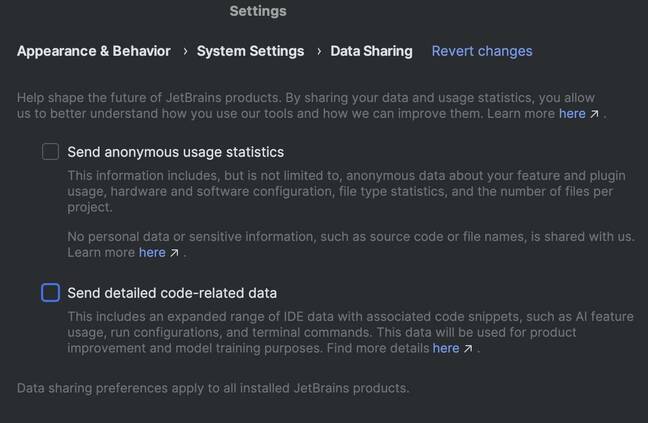IDE and developer tools biz JetBrains believes training AI models on public datasets is insufficient, and is offering free product licenses to organizations that are willing to share detailed code-related data.
The data that will be collected includes code snippets, prompt text, AI responses, edit history, and terminal usage.

The new data-sharing dialog includes agreeing to model training on code snippets
"That sounds like a lot, and it is, but that's where the real value for improvements comes from," said the official post on a new approach to data collection in JetBrains IDEs.
JetBrains argues that most AI coding models are trained on public code that do not reflect the "complex, real-world scenarios" of professional development, and insists that it needs data on real usage in order to provide what is needed. A trial based on collecting internal coding data has been promising, the post states, but needs to be scaled to external users.
The company is offering a substantial incentive to organizations that are happy to hand over their data – free All Products Pack subscriptions for one year for employees, currently priced at $979.00 per user/year. There is a waitlist and the offer is described as limited.
The changed data sharing options are set to land in the 2025.2.4 versions of the JetBrains series of IDEs, expected in around two weeks' time, and including IntelliJ IDEA, PyCharm, Rider, RubyMine, and PhpStorm. The new setting for sharing detailed code-related data specifically states that the data will be used for model training purposes. In some cases, such as for non-commercial users, this data sharing will be enabled by default. The setting will be opt-in for those with commercial licenses, and also off by default for centrally managed organization licenses.
Use of code for model training is uncomfortable both in respect of accidental sharing of intellectual property and, in the worst case, regurgitation of code, as experienced in 2022 by developer Tim Davis.
JetBrains is the most popular tools vendor after Microsoft and the provider of Google's Android Studio, though we note that the current Android Studio invites developers to share data with Google rather than JetBrains, from which we conclude that it is excluded from the forthcoming changes.
Although JetBrains offers its own AI coding agent called Junie, the company also claims to offer a "multi-agent ecosystem" following the integration of Claude Agent in its range of IDEs, built on the Anthropic's Agent SDK and including support for the newly released Claude 4.5 Sonnet LLM (large language model). There is a question, therefore, of whether it makes sense for JetBrains to attempt to compete with the likes of Anthropic and OpenAI by training its own models, rather than focusing on its developer tools alone.
- Strong Java LTS arrives with the release of 25
- Gitpod reinvents itself as Ona in pivot to AI agent platform
- 'Huge architectural change' to JetBrains ReSharper cuts Visual Studio freezes
- Vibe coding platform Anything arrives, our hands-on suggests caution
Junie was well received on first launch but users now complain that it is too expensive, following a new AI quota model introduced in August. "Was good but now, way more expensive than anything else on the market," a user complained two days ago, while another protested that "unless you can stomach adding top-up credits every hour, this is not a fit for you."
The company responded that "there's no scam here. We're aligning usage to real, public provider prices per token." The new plan is a sustainable foundation, said Jetbrains head of marketing Ilya Petrov, adding that AI usage cannot be a flat fee and is unpredictable, depending even on the exact phrasing of a prompt.
The All Product licenses on offer include an AI Pro subscription, but this only covers 10 AI credits per month, with each credit worth $1.00, so even companies taking advantage of free licenses in return for data sharing are likely to face unpredictable additional costs for token usage. ®
.png)


